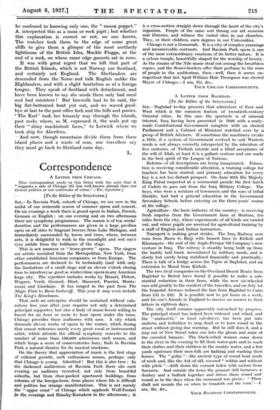A LETTER FROM BAGHDAD.
[To the Editor of the SPECTATOR.]
SIR,—Baghdad to-day presents that admixture of East and West which is the common feature of twentieth-century Oriental cities. In this case the spectacle is of unusual interest, Iraq having been presented in 1920 with a ready- made Constitutional Government complete with an elected Parliament and a Cabinet of Ministers watched over by a group of British Advisers. If sometimes the machinery creaks a little, if a system of Government evolved to suit Western needs is not always correctly interpreted by the inheritors of five centuries of Turkish misrule and a blind acceptance of the will of Allah, at least it is a gallant venture and one made in the best spirit of the League of Nations.
Reforms of all descriptions are being inaugurated. Educa- tion is receiving considerable attention, a training college for teachers has been started, and primary education for every boy is a not too distant prospect. On June 30th His Majesty King Faisal inspected at a ceremonial parade the first batch of Cadets to pass out from the Iraq Military College. The boys, who were a mixture of townsmen and the sons of tribal Sheikhs, had had a general education in the Government Secondary Schools before entering on the three-years' course at the college.
Agriculture—the basic industry of the country—is receiving fresh impetus from the Government farm at Rustiim, ten miles from the city, where experiments of all kinds are carried out, and where pupils are received for agricultural training by a staff of English and Indian instructors.
Transport is making great strides. The Iraq Railway now runs from Basra to Baiji with branch lines to Kirkuk and Iihanaquin—the seat of the Anglo-Persian Oil Company's new venture in Iraq. The railway is steadily being built up from the hastily laid track necessitated by military needs, and is slowly but surely being stabilized financially and practically. There is talk of a bridge across the Tigris at Baghdad, and an extension to Mosul from Kirkuk.
The two rival companies on the Overland Desert Route from Baghdad to Beirut have found it possible to make a sub- stantial reduction in their fares, while the new six-wheeled cars add greatly to the comfort of the traveller, and on July 1st the Imperial Airways reduced the fare from Baghdad to Cairo from £41 to £32. It is possible now to get home in a week, and for one's friends in England to receive an answer to their letters in eighteen days.
The city itself remains apparently untouched by progress. The principal street has indeed been widened and relaid, and the " arabanchi," or local cab-driver, has been put into uniform and forbidden to stop dead or to turn round in the - street without giving due warning. But he still does it, and a step out of New Street takes one into the gloom and noise of the crowded bazaars. The black-robed women come down to the river in the evening to fill their water-pots and to wash their clothes and their children in the muddy water, and a few yards upstream their men-folk are bathing and washing their horses. The " gufas "—the ancient type of round boat made of reeds and, like the Ark of old, covered " within and without
with pitch "—drift down the current laden with melons from Samarra. And outside the town the peasant still harnesses a donkey and a bullock together and drives them round and round as in the days when the command was given : " Thou shalt not muzzle the ox when he treadeth out the com."—1 am, Sir, &c., YOUR BAGHDAD CORRESPONDENT.






































 Previous page
Previous page